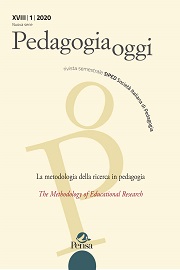Performatività e referenzialità nell’intervista di ricerca: implicazioni epistemologiche
DOI:
https://doi.org/10.7346/PO-012020-03Abstract
A partire da una ricostruzione della cosiddetta svolta pragmatica che ha caratterizzato gli
studi sul linguaggio, questo articolo ne discute le implicazioni in relazione all’uso del linguaggio
come strumento di ricerca. La tesi sostenuta è che assumere una prospettiva pragmatico-
interazionale rispetto a quelle specifiche “forme del parlare” utilizzate per condurre
ricerche empiriche di tipo ricognitivo, sfidi le premesse empiriste su cui – malgrado i
caveat costruzionisti e gli studi sociali della scienza – si basa ancora molta parte della ricerca
scientifica orientata ad informare le pratiche e le politiche (in educazione). Quali le
conseguenze epistemologiche del considerare la referenzialità come un adempimento situato
e interattivo? Per illustrare la tesi, l’articolo prende in esame uno dei metodi tra i più
studiati e più utilizzati nella ricerca in scienze dell’educazione (l’intervista in profondità)
e discute alcune implicazioni epistemologiche derivanti dal mettere in primo piano le proprietà
performative e l’agentività dei dialoghi tra informatore e ricercatore.




